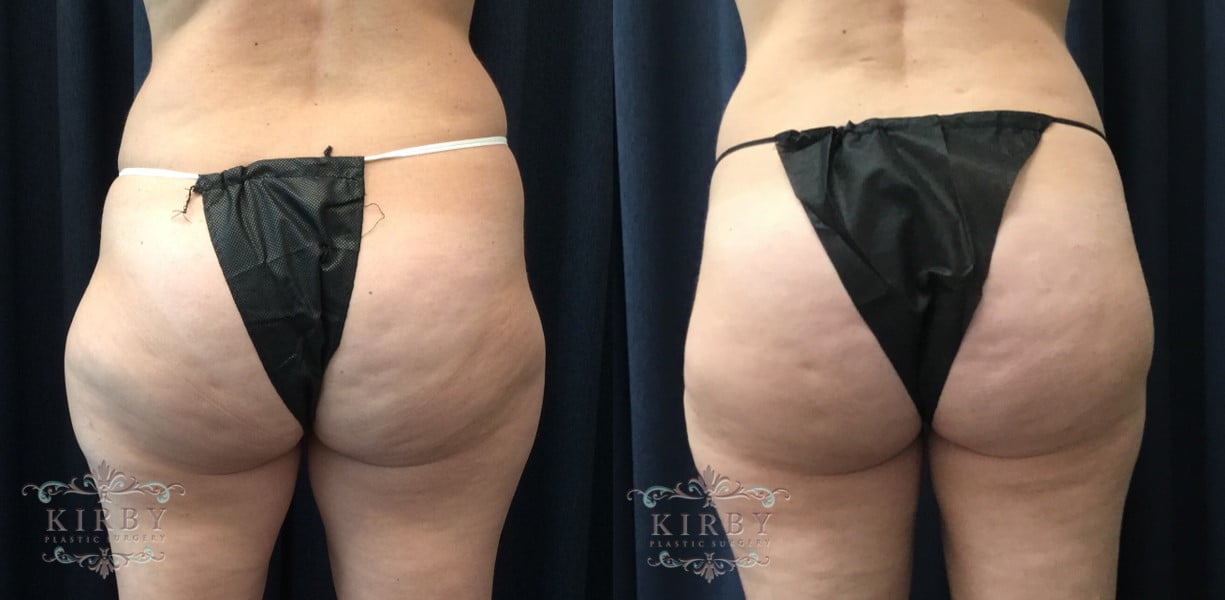Liposuction Fort Worth (Lipoplasty)

Liposuction (lipoplasty) slims and reshapes the body by removing excess fat deposits, most commonly from the thighs, hips, arms, abdomen, back, knee, and neck. The result is a more shapely, proportional, and firmed body contour.
Although you may exercise regularly and be physically fit, localized fat deposits may remain, which can be due to genetic inheritance rather than to weight. Liposuction may be performed in combination with a variety of other breast or body contouring procedures, including tummy tuck (abdominoplasty), or breast reduction, among others.
Where will my incisions be?
Several different small incisions are used to perform your liposuction. The incisions are about 5 mm in length, or about the size of a pea. They will be closed with stitches that dissolve after surgery and will not have to be removed. The placement of your incisions is specific to your body and to your surgery. Dr. Kirby will discuss the incision locations with you prior to your surgery.
Female Plastic Surgeon Fort Worth
- Board-Certified Plastic Surgeon
- Over 12 years of experience in private practice
- Founder and Medical Director of Kirby Plastic Surgery, Kalos Medical Spa, and City Surgery Center—a Quad A-accredited, state-of-the-art facility located onsite
- Specialist in breast surgery and body contouring, including postpartum
- Castle Connolly Top Doctor since 2019
- First female Chief of Plastic Surgery, Texas Health Resources Harris Methodist Hospital

How long will my surgery last?
Liposuction, if performed alone, typically takes 1-2 hours, depending on the areas you have chosen to have treated. Liposuction may be performed in combination with a breast reduction or tummy tuck as well. Combination surgery will take longer.
Real patient images from Board-Certified Plastic Surgeon Dr. Emily Kirby
*Individual results may vary.

What kind of anesthesia will I have?
Liposuction is typically performed under general anesthesia for optimal comfort. It can also be done using intravenous sedation that gives you medicine through an IV in your arm that makes you drowsy. Dr. Kirby will discuss these options with you so that the best choice can be made.
Who is a good candidate for liposuction?
People within 30% of their ideal weight who have firm, elastic skin and good muscle tone are the best candidates for liposuction. Liposuction surgery is not a treatment for obesity and is not a replacement for regular exercise and good eating habits.
- Key Benefits
- Glossary
- Targeted reduction of stubborn fat deposits that are resistant to diet and exercise
- Can be used throughout the body, including in the abdomen, thighs, arms, back, and the “bra bulge” area
- Permanently removes fat cells for long-lasting results, provided you maintain a stable weight
- Can be combined with other procedures, such as tummy tucks or breast augmentation
- Adipose Tissue: The body’s fat tissue, targeted during liposuction for removal to reshape and contour various areas of the body.
- Cannula: A thin, tube-like instrument used in liposuction to loosen and suction fat from the body.
- Compression Garment: Specialized clothing worn after liposuction to reduce swelling, support the treated areas, and help the body adjust to its new contours.
- General Anesthesia: Medication administered to induce sleep and relaxation during the liposuction procedure.
- Liposuction (Lipo): A cosmetic procedure that removes excess fat from specific areas of the body, such as the abdomen, hips, thighs, buttocks, arms, or neck, to improve their shape.
- Local Anesthesia: Medication used to numb a specific area of the body; in liposuction, this may be used to allow the patient to remain awake but pain-free during the procedure.
- Lymphedema: A condition of localized fluid retention and tissue swelling caused by a compromised lymphatic system, which can occasionally be a risk or concern after liposuction.
- Power-Assisted Liposuction (PAL): A liposuction technique that uses a vibrating tool to break up fat cells before removal, potentially allowing for more precise fat removal with less physical effort.
- Recovery Time: The period after liposuction during which the patient heals. This includes time for swelling and bruising to subside, and for the patient to gradually return to normal activities, typically ranging from a few days to several weeks. Recovery can be streamlined, but not rushed.
- Seroma: An accumulation of fluid in the tissue spaces after surgery, a potential complication of liposuction that may require drainage.
- Suction-Assisted Liposuction (SAL): A traditional liposuction technique where fat is removed through a suctioning process after being loosened with a cannula.
- Tumescent Liposuction: A widely used liposuction technique that involves injecting a medicated solution into the fatty areas before removal to minimize blood loss and pain.
- Ultrasound-Assisted Liposuction (UAL): A liposuction technique that uses ultrasound energy to liquefy fat cells before removal, potentially allowing for easier fat removal and less trauma to surrounding tissues.
- VASER Liposuction: A variant of ultrasound-assisted liposuction that uses ultrasound technology to target and dissolve fat cells while preserving surrounding tissues.
What are the risks of liposuction?
The decision to have liposuction is extremely personal and you will need to decide if the benefits will achieve your goals and if the risks and potential complications are acceptable. Possible liposuction risks include: uneven skin contour, rippling or loose skin, skin or nerve damage, skin discoloration, infection, fat clots or blood clots, unfavorable scarring, thermal burn or heat injury from ultrasound with the ultrasound-assisted lipoplasty technique, anesthesia risks, bleeding (hematoma), asymmetry, damage to deeper structures such as nerves, blood vessels, muscles, lungs, and abdominal organs, persistent swelling in the legs, deep vein thrombosis, cardiac and pulmonary complications, possibility of revisional surgery.
“Dr. Kirby and her amazing staff have been an absolute God send! From the first time I stepped into her office I felt welcomed and genuinely comfortable. My biggest fear is that there would be a moment of embarrassment about my needs, but there never was. I had liposuction completed on my abdomen and back, and the results have been life changing to say the least. I feel like I have a new body! Dr. Kirby must have a magic wand she keeps hidden because my results are truly magical. She answered all of my questions throughout the process and has been encouraging and positive through the follow ups. The office staff and nursing staff are also part of the reason why I would recommend Dr. Kirby to anyone and everyone. They are so incredibly helpful and kind! They greet you with a smile at every appointment and are as helpful as possible. If you are considering any type of plastic surgery, search no more, Dr. Kirby is the absolute BEST!”
How do I prepare for surgery?
Prior to any procedure, it is necessary to review medications you are taking that may affect your surgery. You may be asked to stop or to adjust some medications you are on. As always, it is important to include supplements on your list of medications. Aspirin and aspirin products (Alka-Seltzer, Carisoprodol, Excedrin, Goody’s, Midol), anti-inflammatory medications (except acetaminophen, or Tylenol), and herbal supplements must be avoided for 10 days prior to your surgery. Learn more about which medications and supplements to avoid. Dr. Kirby will discuss your medications with you.
Depending on your medical condition, you may be asked to get lab testing or a medical checkup prior to your surgery.
Tobacco products impair your body’s ability to heal. You will be asked to stop smoking for 6 weeks prior to any surgery. Tobacco step-down products such as chewing gum and Nicoderm continue to provide your body with tobacco and must be stopped as well. Please ask Dr. Kirby if you will need assistance with quitting.
Be sure to arrange for a responsible adult to drive you to and from your surgery. You will need someone to stay with you the night following your surgery as well.
You will receive specific instructions for your surgery day from Dr. Kirby’s office.
Dr. Emily Kirby uses Enhanced Recovery After Surgery (ERAS) protocols, also known as “multimodal analgesia,” to minimize recovery time, and we see real results: our patients experience less nausea and feel more alert, mobile, and comfortable after their procedures.
“I had very hard recoveries in the past…it took me weeks to get back to caring for my family. With Dr. Kirby, I had a wonderful recovery and was back to my activities surprisingly quickly. Don’t tell the doctor, but I was at my child’s sporting event the day after my surgery, and I felt great!”
—Real patient of Dr. Kirby
What is recovery from liposuction surgery like?
After liposuction surgery, you should expect to have some soreness, swelling, and some temporary changes in sensation. Typically you can expect to return to work within a week after your procedure, depending on your occupation. Soreness will likely last for several weeks, though. You will wear a tight post-operative garment following surgery to help your body heal appropriately. Scar massage techniques will be discussed by Dr. Kirby when the timing is appropriate.
References »
Shridharani SM, Broyles JM, Matarasso A. Liposuction devices: technology update. Medical devices (Auckland, NZ). 2014 Jul 21;7:241-51. doi: 10.2147/MDER.S47322.
Yoshida S, Koshima I, Imai H, Roh S, Mese T, Uchiki T, Sasaki A, Nagamatsu S. Effect of Postoperative Compression Therapy on the Success of Liposuction in Patients with Advanced Lower Limb Lymphedema. Journal of Clinical Medicine. 2021 Oct 22;10(21):4852. doi: 10.3390/jcm10214852.
Wu S, Coombs DM, Gurunian R. Liposuction: Concepts, safety, and techniques in body-contouring surgery. Cleveland Clinic Journal of Medicine. 2020 Jun;87(6):367-375. doi: 10.3949/ccjm.87a.19097.
Bellini E, Grieco MP, Raposio E. A journey through liposuction and liposculture: Review. Annals of Medicine and Surgery. 2017 Nov 6;24:53-60. doi: 10.1016/j.amsu.2017.10.024.
Venkataram J. Tumescent liposuction: a review. Journal of Cutaneous and Aesthetic Surgery. 2008 Jul;1(2):49-57. doi: 10.4103/0974-2077.44159.
Tong Y, Liu P, Wang Y, Geng C, Han X, Ma J, Li F, Cai L. The Effect of Liposuction Cannula Diameter on Fat Retention-Based on a Rheological Simulation. Plastic and Reconstructive Surgery Global Open. 2018 Nov 19;6(11):e2021. doi: 10.1097/GOX.0000000000002021.
Mecott GA, Gonzalez-Cantu CM, Moreno-Peña PJ, Flores PP, Castro-Govea Y, de Oca-Luna RM, Perez-Trujillo JJ, Garcia-Perez MM. Effect of Diameter and Fenestration Area of the Liposuction Cannula on the Viability of the Adipocytes. Aesthetic Plast Surg. 2022 Apr;46(2):912-919. doi: 10.1007/s00266-021-02712-7.
Mentz JA, Mentz HA, Nemir S. Pneumothorax as a Complication of Liposuction. Aesthetic Surgery Journal. 2020 Jun 15;40(7):753-758. doi: 10.1093/asj/sjaa029.
Diniz DA, Gonçalves KK, Silva CC, Araújo ES, Carneiro SC, Lago CA, Vasconcelos BC. Complications associated with submental liposuction: a scoping review. Med Oral Patol Oral Cir Bucal. 2022 May 1;27(3):e257-e264. doi: 10.4317/medoral.25122.
Stein MJ, Matarasso A. High-Definition Liposuction in Men. Clin Plast Surg. 2022 Apr;49(2):307-312. doi: 10.1016/j.cps.2022.01.003.
Karcher C. Liposuction Considerations in Men. Dermatol Clin. 2018 Jan;36(1):75-80. doi: 10.1016/j.det.2017.09.010.
Beidas OE, Gusenoff JA. Update on Liposuction: What All Plastic Surgeons Should Know. Plast Reconstr Surg. 2021 Apr 1;147(4):658e-668e. doi: 10.1097/PRS.0000000000007419.
Area Served:
Call today to book your consultation with Dr. Emily J. Kirby- Discuss your goals and concerns with a board certified plastic surgeon
- Obtain a unique female perspective
- Review convenient financing options
- Call or text (817) 292-4200 or contact us today!

Medically reviewed by Dr. Emily J. Kirby — Updated on Apr 18, 2024